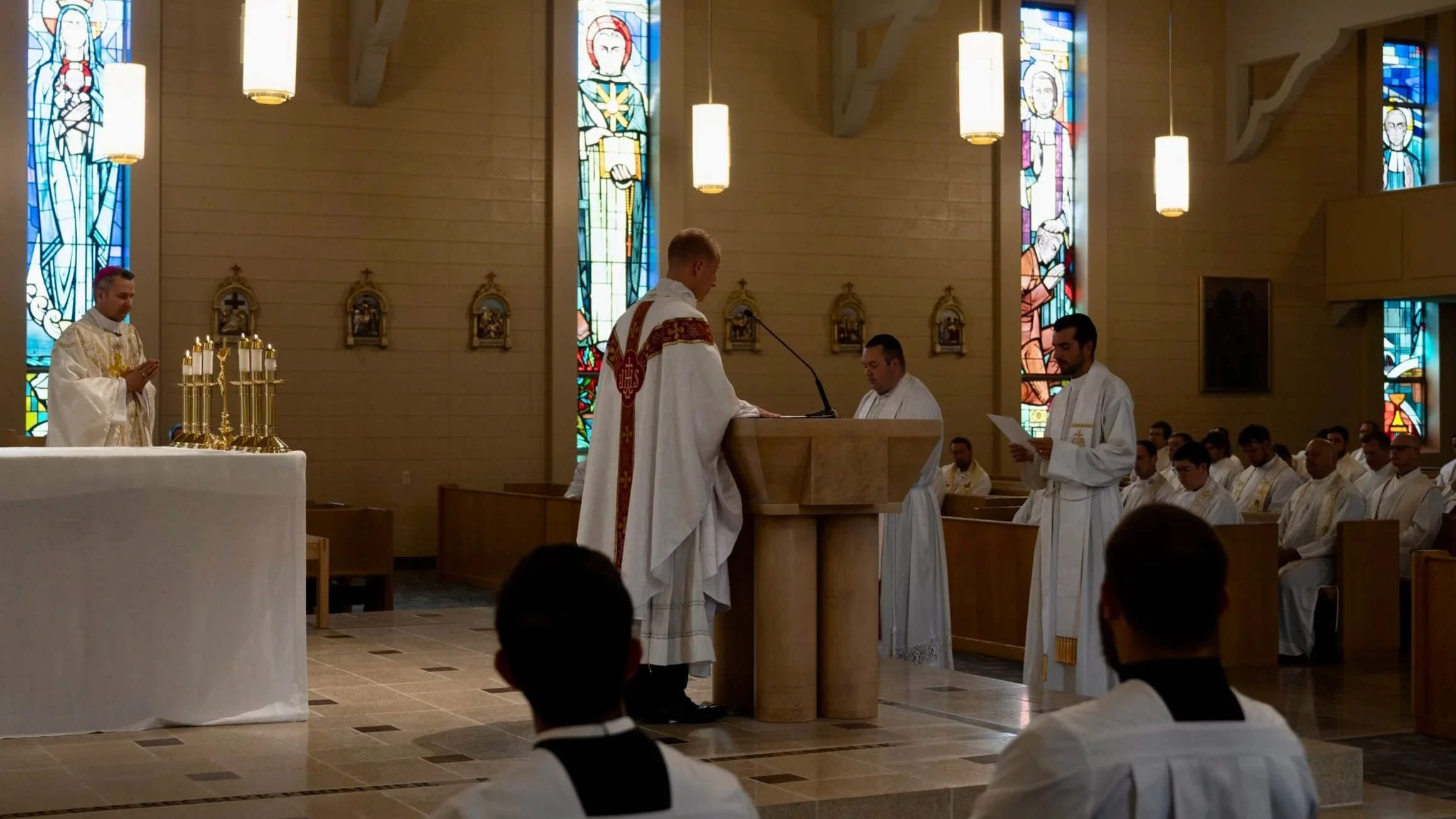
Frequently Asked Questions
Why the Companions?
Out of a desire for holiness and better service of Christ and His Church, we have discerned that the Holy Spirit has called us to pursue a formally structured way of living out our priestly vocations centered around the common life. United by our rule of life and common ideals, we give our brother Companions and the local Church the authority to speak into our lives and hold each other accountable to our way of life. Our commitment to living together and supporting each other's attempts to grow in holiness comes from a conviction that, for us, we can serve the Church most effectively, and encounter Jesus deeply when cultivating the common life.
If you want community, why not just join a religious order?
Communal life is an essential part of the Christian life. All Companions have discerned and committed ourselves to the diocesan priesthood. At the same time, we believe the Holy Spirit is offering us the benefits of a structured communal life to compliment the priestly life today.
Why seek out communal life as diocesan priests?
In the history of the diocesan priesthood, sharing in the common life has been the norm. [1] Indeed, Vatican II [2], Canon Law [3], St. John Paul II [4], Pope Benedict XVI [5], and the 2013 Directory of the Ministry and Life of Priests [6] have all encouraged its practice in our age. Benedict XVI explained, “Community life is therefore the expression of a form of assistance that Christ gives to our life by calling us, through the presence of brothers, to an ever deeper configuration to him. Living with others means accepting the need for one’s own continuous conversion and, especially, discovering the beauty of this journey, the joy of humility, of penance, but also of conversation, of mutual forgiveness and of reciprocal support.” [7] Sharing in the common life can also help to mitigate the potential for isolation, individualism, and a “bachelor mentality” within our vocations. “It is not good for man to be alone.” (Genesis 2:18)
If it’s not a religious order, then what is the Companions of Christ?
We are a group known by Church law as a private association. A private association is a group of Catholics, governed by statutes, that gathers for some purpose of serving the Church. When recognized by their competent authority, these groups have rights and obligations which, among other things, allow them to have and own property in common. Since we are a private association of clerics, our association is limited to priests and transitional deacons serving within the Diocese of Joliet, and we are directly accountable to the bishop of our diocese.
Do Companions take vows?
As Companions, we make private promises to follow our Rule and pursue the evangelical counsels in our priestly ministry. These promises are primarily oriented to our own pursuit of holiness, whereas vows are oriented towards the sanctification of the entire Church. Promises, unlike religious vows, do not require canonical dispensation should a member decide to leave the association. After at least three years of candidacy, candidates can make a temporary commitment to the association for year-long increments. After the passing of a minimum of another three years, members can make a definitive commitment to the association, which is renewed annually. Definitively committed members can withdraw from the association for personal reasons at any time with the approval of the moderator.
Where does obedience come into all of this?
As diocesan priests of the Diocese of Joliet, we are subject to the normal ecclesiastical hierarchy within the diocese. The Companions of the Archdiocese of St. Paul/Minneapolis, the Archdiocese of Denver, and the Diocese of Joliet are separate associations who acknowledge each other as sharing the same charism. Our association elects a moderator every three years to be the structural head of the Companions, and he is advised by the moderator’s council. Members subject themselves to the moderator only in Companions-related matters, such as the delegation of duties and the following of the Rule. The association is governed by our statutes.
Aren’t priests supposed to live in their parish rectory?
The law of the Church recognizes the importance of priests living near their parish assignment. Proximity to the parish provides many obvious pastoral benefits and conveniences for priests. However, “for a just cause,” Canon Law provides bishops with the power to allow their priests to reside elsewhere, “especially in a house shared by several presbyters, provided that the performance of parochial functions is properly and suitably provided for.” [8] The Diocese of Joliet has a high concentration of her faithful in a relatively small geographical area. So, it is certain that the Companions of Christ will not neglect their pastoral duties while living out the common life.
What if the Diocese needs Companions to be assigned far away from each other?
We are Companions because we have received a charism to help us minister to the people of the Diocese of Joliet. Always desiring to reside together in common whenever possible, we serve wherever the Diocese needs us most. Should circumstances require that we not live in common residence, we would nevertheless pursue our common life to the furthest extent possible.
Is the Companions of Christ for every priest?
We believe that the life of the Companions is firstly a charism, and so we recognize that the Companions’ model is not for every priest. However, we are eager to share our life with any who believe they may be called to join our brotherhood. Based on the decades of experience of the Companions in St. Paul and Denver, we look forward to welcoming new brothers to our association in years to come. Discover more here.
[1] See the book-length treatment of the history of the common life regarding the diocesan priesthood in Vita Communis by Jerome Bertram.
[2] “And further, in order that priests may find mutual assistance in the development of their spiritual and intellectual life, that they may be able to cooperate more effectively in their ministry and be saved from the dangers of loneliness which may arise, it is necessary that some kind of common life or some sharing of common life be encouraged among priests. This, however, may take many forms, according to different personal or pastoral needs, such as living together where this is possible, or having a common table, or at least by frequent and periodic meetings. One should hold also in high regard and eagerly promote those associations which, having been recognized by competent ecclesiastical authority, encourage priestly holiness in the ministry by the use of an appropriate and duly approved rule of life and by fraternal aid, intending thus to do service to the whole order of priests.” - Vatican II, Decree Presbyterorum Ordinis, 8, December 7, 1965: AAS 58 (1966) 1004-1005.
[3] Can. 280: “Some manner of common life is highly recommended to clerics; where it exists, it is as far as possible to be maintained.” - Code of Canon Law (January 1983)
[4] “Many ways and means are at hand to make ongoing formation an ever more precious living experience for priests. Among them, let us recall the different forms of common life among priests, which have always existed, though they have appeared in different ways and with different degrees of intensity, in the life of the Church: ‘Today, it is impossible not to recommend them, especially among those who live together or are pastorally involved in the same place. Besides the advantage which comes to the apostolate and its activities, this common life of priests offers to all, to fellow priests and lay faithful alike a shining example of charity and unity.’ (Synod of Bishops, 8th Ordinary General Assembly, Instrumentum Laboris, 60)” - John Paul II: Pastores Dabo Vobis, 81, (I Will Give You Shepherds; I992)
[5] “I believe that celibacy becomes a very meaningful sign, and above all becomes possible to live, when priests begin to form communities. It is important for priests not to live off on their own somewhere, in isolation, but to accompany one another in small communities, to support one another, and so to experience, and constantly realize afresh, their communion in service to Christ and in renunciation for the sake of the Kingdom of heaven.” - Benedict XVI, Light of the World, A Conversation With Peter Seewald; San Francisco, Ignatius Press, 2010, p. 149.
[6] Congregation for the Clergy, Directory for the Ministry and Life of Priests: New Edition, Città del Vaticano, Libreria Editrice Vaticana, 2013. http://www.clerus.org/clerus/dati/2013-06/13-13/Direttorio_EN.pdf
[7] Benedict XVI, Address to the Priestly Fraternity of the Missionaries of St. Charles Borromeo, February 12, 2011.
[8] Can. 533 §1. A pastor is obliged to reside in a rectory near the church. Nevertheless, in particular cases and if there is a just cause, the local ordinary can permit him to reside elsewhere, especially in a house shared by several presbyters, provided that the performance of parochial functions is properly and suitably provided for.
Can. 550 §1. A parochial vicar is obliged to reside in the parish or, if he has been appointed for different parishes jointly, in one of them. Nevertheless, for a just cause the local ordinary can allow him to reside elsewhere, especially in a house shared by several presbyters, provided that this is not detrimental to the performance of his pastoral functions.
